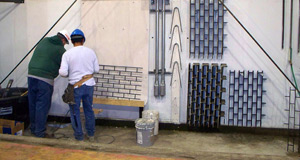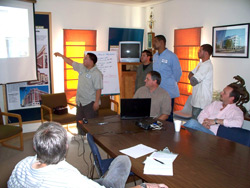Lean Approach to Manufacturing Makes SMC Bigger and Stronger than the Rest
April 14, 2009 | Associate / Plant News
MIDLAND, Va. – In a time when most companies are focusing on survival, Smith-Midland Corporation of Midland, Virginia, is transforming. They are tearing down the walls on what is typically known as “economy of scale,” or traditional manufacturing and taking a more holistic approach to the process of manufacturing precast concrete. Ultimately, they will build a better, bigger, and stronger company which, in turn, may result in a more profitable company.
According to Chris Kemp, Director of Continuous Improvement for Smith-Midland, the company is undergoing what can best be described as a “lean” transformation. “The transformation will focus on the three main factors that production managers fear most: poor quality, increase in production costs, and an increase in lead time. It will be a shift from the traditional manufacturing system to a model that emulates the Toyota Production System.”
Traditional manufacturing focuses all of its attention on how quickly processes can complete a task. It isolates production in each area along the way and emphasizes a top down approach to identifying and correcting problems. This makes it difficult to react quickly when a problem arises. It is a typical and cumbersome approach to manufacturing.
 Smith-Midland is dismantling this model. They are looking at material as it flows through the process of manufacturing and engaging employees to address and correct problems they encounter throughout the process. Continuous improvement focuses on addressing problems one project at a time.
Smith-Midland is dismantling this model. They are looking at material as it flows through the process of manufacturing and engaging employees to address and correct problems they encounter throughout the process. Continuous improvement focuses on addressing problems one project at a time.
The new production system will place an emphasis on identifying process standards. This means that Smith Midland will build their products the same way every time. Once the standards are established, then pressure through auditing or inspections will be applied to the system to expose waste within the process. Once the waste is identified, it will be assigned as a project for correction and elimination. A project simply becomes a problem with a scheduled resolution. Once the project is complete, it becomes a new standard and then the process starts all over again.
The continuous improvement approach to production is based on employee empowerment. . . the company must engage their employees to address and correct the problems they encounter throughout the process. Smith-Midland has teamed up with the local community college system to provide the appropriate training for employees. The curriculum will focus on “workforce development,” i.e., basic problem solving, leader development and general quality understanding. All the classes will develop employees and give them the skills they need to overcome issues as they arise in their daily job performance.
Kemp likened the transformation to a work-out. “Currently, we are just beginning our journey to total fitness. As we work out muscles will be sore, but they are getting strong, and ultimately, we will adapt and get leaner. The ultimate outcome will be a more profitable company, the quality will be superior and we will become more desirable to both the external and internal customer. We will continuously look for ways to reinvent the company.”
Smith-Midland Corporation is a publicly traded company (OTC BB: SMID, SMIWC; Boston Stock Exchange: SMM, SMM/W). Smith-Midland develops, manufactures and sells a broad array of precast concrete products for use primarily in the construction, transportation and utilities industries. Smith-Midland has two manufacturing facilities located in Midland, Virginia and Reidsville, North Carolina. For more information, please call (540) 439-3266 or visit www.smithmidland.com.
Media Inquiries:
media@smithmidland.com
Sales Inquiries:
(540) 439-3266
